 |
|||||||||




 |
|||||||||




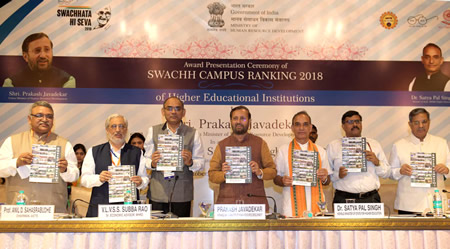
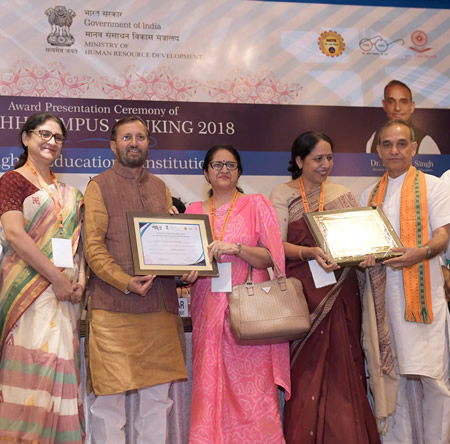
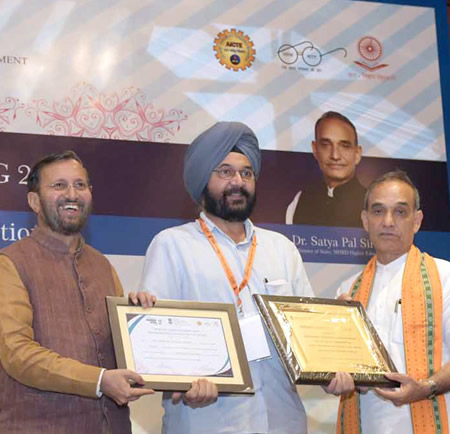
Photos: India’s Minister for Human Resource Development, Prakash Javadekar, presented the Annual Swachhata Rankings Awards for the cleanest and most hygienic higher educational institutions, at a function, in New Delhi on October 01, 2018.
India’s Minister for Human Resource Development, Prakash Javadekar, conferred Swachhata (Cleanliness) Ranking Awards 2018 for higher educational institutions in New Delhi today. The Ministry has selected 51 higher educational institutions for Swachhata Ranking Awards in 8 different categories.
Javadekar said that cleanliness must be a habit in students and it can be developed only in educational institutions. Therefore, his Ministry is promoting and rewarding cleanliness efforts of educational institutions.
The Minister emphasized that we should educate our society about solid waste management, electronic waste management, and water harvesting techniques so that we may make our country more eco-friendly and clean.
The Union Minister also released two books during the event — 1. Elective Course Curriculum on Swachhata and Waste Management, 2. Booklet on 60 HEIs campus and Village Swachhata Activities.
Minister of State for HRD, Dr. Satya Pal Singh; Secretary, Higher Education, R. Subrahmanyam; Chairman UGC, Prof. D.P.Singh; and Chairman AICTE, Anil Sahasrabudhe were also present during the event.
Maharishi Dayanand University in Rohtak, Haryana, has been ranked the cleanest government university followed by Guru Nanak Dev University, Amritsar.
Among the residential campuses of private universities, Pune’s Symbiosis International University leads, followed by OP Jindal Global University in Sonipat.
In the Residential Colleges Category, MCM DAV College for Women, Chandigarh, tops in the country.
FINAL LIST OF INSTITUTIONS FOR SWACCHATA RANKINGS 2018
CATEGORY: GOVERNMENT UNIVERSITIES
CATEGORY: UNIVERSITY (RESIDENTIAL)
CATEGORY: UNIVERSITY ( NON-RESIDENTIAL)
CATEGORY: COLLEGE ( RESIDENTIAL)
CATEGORY: COLLEGE ( NON-RESIDENTIAL)
CATEGORY: TECHNICAL INSTITUTIONS /UNIVERSITIES ( RESIDENTIAL)
CATEGORY: TECHNICAL COLLEGE (RESIDENTIAL)
CATEGORY: TECHNICAL COLLEGE ( NON-RESIDENTIAL)
Source: Ministry of Human Resource Development, New Delhi
|GlobalGiants.Com|
Edited & Posted by the Editor | 10:25 AM | View the original post
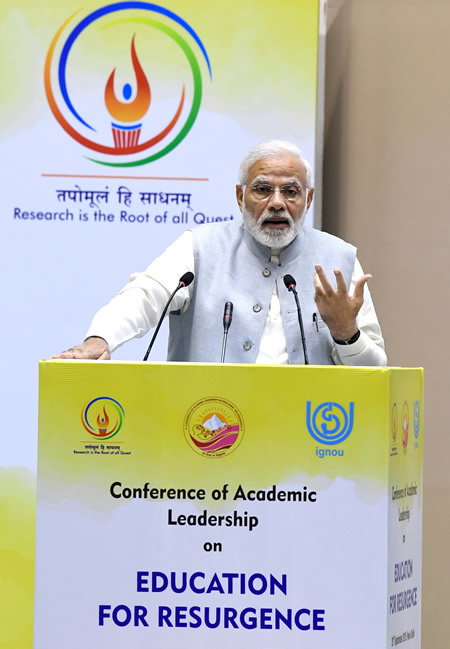
Photo: Prime Minister Narendra Modi addressing at the inauguration of the Conference on Academic Leadership on Education for Resurgence, in New Delhi on September 29, 2018.
New Delhi, 29 September 2018 — Prime Minister Narendra Modi today addressed a Conference on Academic Leadership on Education for Resurgence, in New Delhi, in which the Vice-Chancellors and Directors from more than 350 universities in India participated.
Mr, Modi said that when one thinks of resurgence or revival, the first image that comes to mind is of Swami Vivekananda, who presented before the world, the strength of Indian thought.
The Prime Minister recalled Swami Vivekananda’s emphasis on self-reliance, character building, and human values, as elements of education. The Prime Minister said innovation is another vital element of culture today.
Recalling the ancient Indian texts, the Vedas, the Prime Minister said that we could not imagine our society, our country, and even our lives, without knowledge. He said that our ancient universities such as Taxila, Nalanda, and Vikramshila, gave importance to innovation, besides knowledge.
Narendra Modi said that today, no country or person could live in isolation. He mentioned the importance of thinking concerning ‘global citizen’ or ‘global village.’ He said our Universities and Colleges should be leveraged to find solutions to the challenges facing us. We should “Interlink Institutions to Innovate and Incubate,” he added.
Source: Prime Minister’s Office
|GlobalGiants.Com|
Edited & Posted by the Editor | 7:15 AM | View the original post
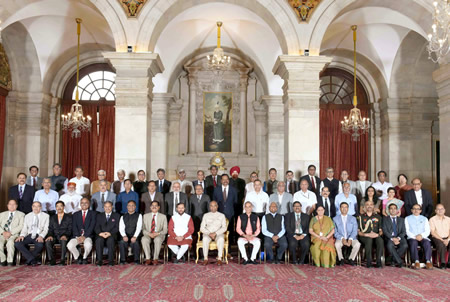
Photo: The President of India, Ram Nath Kovind, with the Vice Chancellors of Central Universities and Visitor’s Awardees, at Rashtrapati Bhavan, in New Delhi on May 02, 2018. [File Photo]
New Delhi, September 28, 2018 — A “Conference on Academic Leadership on Education for Resurgence” is being organized on 29th September 2018 in Vigyan Bhawan, New Delhi, in which the Vice-Chancellors and Directors from more than 350 universities are participating.
The theme of the Conference is to deliberate on the challenges facing the Indian education system and to work out a plan for a paradigm shift both regarding achieving academic outcomes and the regulation of education.
The Conference would be inaugurated in the morning by the Prime Minister of India, Narendra Modi, which will be followed by breakout sessions covering following eight thematic areas:
Prakash Javadekar, Minister for Human Resource Development, will chair the valedictory session, in which each of the eight groups will make the presentation on their opinion on the best course of action. It will be debated further in the Plenary Session to arrive at a comprehensive action plan for the advancement of higher education in India.
Source: Prime Minister’s Office, New Delhi
|GlobalGiants.Com|
Edited & Posted by the Editor | 6:26 AM | View the original post
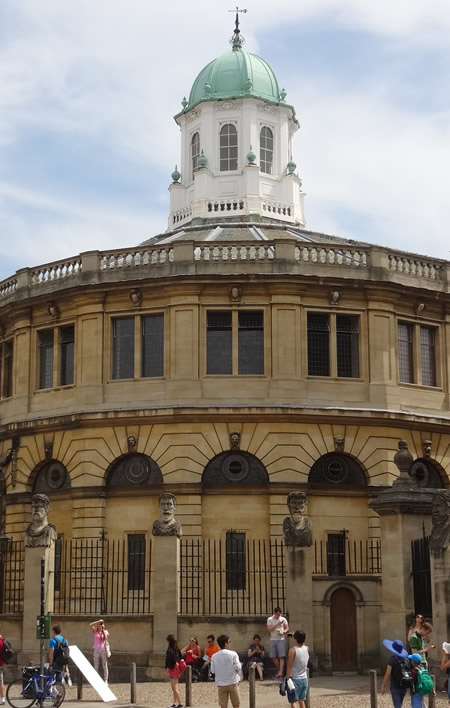
Photo: Sheldonian Theatre (built in 1668), University of Oxford. The University of Oxford tops Times Higher Education’s this year’s list of the best universities in the world. (Image Credit: Harry NL).
LONDON — Times Higher Education (THE) today announced its World University Rankings 2019, which includes more than 1,250 universities, making it THE’s biggest international league table to date.
This global universities performance table judges research-intensive universities across all of their core missions: teaching, research, knowledge transfer and international outlook. “We use 13 carefully calibrated performance indicators to provide the most comprehensive and balanced comparisons, trusted by students, academics, university leaders, industry and governments,” Times Higher Education said after the announcement.
According to THE, “The calculation of the rankings for 2019 has been audited by professional services firm PricewaterhouseCoopers (PwC), making these the only global university rankings to be subjected to full, independent scrutiny of this nature.”
• The University of Oxford and the University of Cambridge lead this year’s list of the best universities in the world.
Yale University is the only newcomer to the top 10, joining at eighth place, up from 12th. Meanwhile, Switzerland’s ETH Zurich has fallen out of this elite group, dropping from joint 10th to 11th place.
Tsinghua University is now the top university in Asia, after rising eight places to 22nd, becoming the first Chinese institution to lead the continent under the current methodology.
Elsewhere in Asia, Japan has overtaken the UK as the second most-represented nation in the world, with 103 institutions (the UK has 98).
France has a top 50 university for the first time since 2011, while several leading universities in Italy, Spain, and Canada have risen.
Overall, 86 countries are represented, including Iraq, Jamaica, Nepal, Tanzania, and Kazakhstan for the first time.
THE World University Rankings 2019: Top 30
THE World University Rankings 2019
Institutions from INDIA
RANK — INSTITUTION
Source: Times Higher Education (THE)
|GlobalGiants.Com|
Edited & Posted by the Editor | 11:56 AM | View the original post

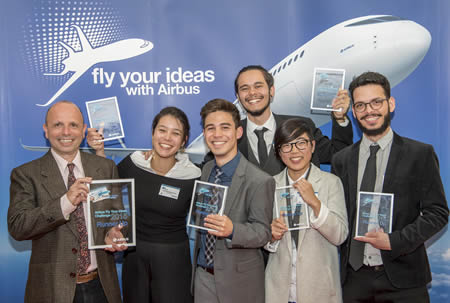
Photo: Airbus Fly Your Ideas 2015 runners-up Team Retrolley from University of São Paulo Brazil. From left: Fausto Mascia, Academic mentor University of Sao Paolo, Denise Ikuno, Lucas Otsuka, Tadeu Omae, Maki Shintate, Lucas Neumann.
The next generation of innovators can now submit their proposals tackling one of the six challenges set out by Airbus for its sixth global Fly Your Ideas competition (Electrification, Data Services, Cyber Security, Internet of Things, Artificial Intelligence and Mixed Reality).
The biennial competition is a celebration of creativity and innovation to solve real industry challenges. Open to university teams from across the world, including all disciplines from engineering and information technology to marketing and design, the competition is an opportunity for students to unleash their pioneering spirit, working at the cutting edge of digital technology alongside industry experts. UNESCO granted patronage to Fly Your Ideas in 2012.
“Fly Your Ideas is an inspirational endeavor for students around the world and UNESCO is proud to be a part of this initiative,” said Audrey Azoulay, Director-General of UNESCO. “The new challenges will allow students to think outside the box and come up with sustainable solutions for global problems beyond aerospace - exactly what the world needs from our future generations!”
The submission phase would end on 16 November 2018. A team of Airbus specialists from across the business will review and evaluate all submitted ideas. The live final of Fly Your Ideas will be held in 2019, where students will have the opportunity to showcase their ideas to an audience of industry experts.
Airbus is seeking ideas that could change aerospace in the decades to come and create a safer, cleaner and better-connected world. The competition is an opportunity for students to build valuable employment skills including teamwork, project management, and presentation skills and to apply their classroom learning to real-world challenges.
Sources: AIRBUS and UNESCO
|GlobalGiants.Com|
Edited & Posted by the Editor | 4:13 AM | View the original post
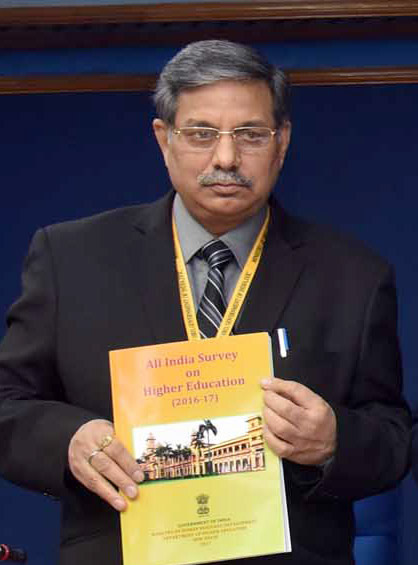
Photo: Chairman, University Grants Commission of India (UGC), Prof. D. P. Singh, releasing a publication. [File Photo]
New Delhi, September 20, 2018 — India’s Human Resource Development Minister, Prakash Javadekar, today addressed the “National Workshop on Graded Autonomy” organized for Vice Chancellors of Universities.
Mr. Javadekar said that “Autonomy is crucial for the Higher Educational Institutions to achieve excellence and the Government is committed to ensuring the autonomy of our Universities.”
The workshop has been jointly organized by Ministry of Human Resource Development (MHRD) and University Grants Commission (UGC) for providing a platform to Vice-Chancellors from around 63 universities categorized as Category I and Category II Institutions under UGC Regulations on Graded Autonomy. The senior officers of MHRD, UGC, and select State governments were also present on this occasion, besides participants from 55 HEIs.
Mr. Javadekar said that UGC regulations on graded autonomy is a significant reform and the universities should fruitfully utilize this opportunity. Terming the 63 ranked universities as “cream of the cream,” he further said that the Universities need to maintain high academic standards to sustain their autonomy. Citing the example of American Universities, he said that the best universities attract the best talent from around the world and thereby make an essential contribution to the development of the country.
A detailed presentation was made by Prof D P Singh, Chairman, UGC, on graded autonomy, highlighting the various aspects of UGC Regulations on Graded Autonomy which provide an enabling framework to Universities for adopting a decentralized management culture, ensuring freedom to HEIs on deciding academic issues.
Presentations were made by Vice Chancellors of Banaras Hindu University, Guru Nanak Dev University, Alagappa University, BITS Pilani, Symbiosis International, Institute of Chemical Technology, and O. P. Jindal Global University, highlighting their roadmap for achieving the objectives of graded autonomy.
During the open interactive session, the Vice Chancellors expressed their concerns and shared their experiences while implementing the Autonomy Regulations. The Secretary, Higher Education, MHRD, Mr. R. Subramanyam, interacted with the Vice Chancellors and assured them that his Department would appropriately address their concerns.
Source: Ministry of Human Resource Development, New Delhi.
|GlobalGiants.Com|
Edited & Posted by the Editor | 2:42 PM | View the original post

Photo: Sofia Carson arrives on the red carpet of The 90th Oscars at the Dolby Theatre in Hollywood, CA on Sunday, March 4, 2018. Image Credit: Aaron Poole / A.M.P.A.S. [File Photo].
LOS ANGELES, CA — The Academy has voted 19 students as winners of the Student Academy Awards 45th competition. This year, the Student Academy Awards competition received a total of 1,582 entries from 278 domestic and 122 international colleges and universities, which were voted upon by a record number of Academy members. The 2018 winners join the ranks of such past Student Academy Award winners as Patricia Cardoso, Pete Docter, Cary Fukunaga, John Lasseter, Spike Lee, Trey Parker, Patricia Riggen, and Robert Zemeckis.
The winners are (listed alphabetically by film title):
Alternative (Domestic Film Schools)
Animation (Domestic Film Schools)
Animation (International Film Schools)
Documentary (Domestic Film Schools)
Documentary (International Film Schools)
Narrative (Domestic Film Schools)
Narrative (International Film Schools)
First-time honors go to MOPA (Motion Pictures in Arles) France, and the University of Hertfordshire, England. This year, the Student Academy Awards honors one returning winner in the Domestic Narrative category, Brian Robau, a Silver Medal winner in 2016 for “It’s Just a Gun.” Additionally, for the first time, a team of five directors is being honored in the International Animation category.
All Student Academy Award-winning films are eligible to compete for 2018 Oscars in the Animated Short Film, Live Action Short Film or Documentary Short Subject category. Past winners have gone on to receive 59 Oscar nominations and have won or shared 11 awards. This year, two 2017 Student Academy Award winners received Oscar nominations in the Live Action Short Film category: Kevin Wilson, Jr., a Gold Medal winner in the Domestic Narrative category for “My Nephew Emmett,” and Katja Benrath, a Gold Medal winner in the International Narrative category for “Watu Wote/All of Us.”
Students will arrive in Los Angeles for a week of industry activities that will culminate in the awards ceremony on Thursday, October 11 at the Samuel Goldwyn Theater in Beverly Hills. There, the Academy will announce the medal winners - gold, silver, and bronze - in the seven award categories.
The Student Academy Awards were established in 1972 to provide a platform for emerging global talent by creating opportunities within the industry to showcase their work.
Source: Academy of Motion Picture Arts and Sciences
|GlobalGiants.Com|
Edited & Posted by the Editor | 5:40 AM | View the original post
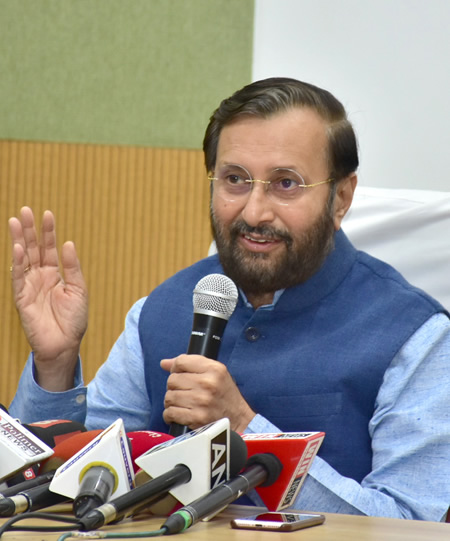
Photo: India Minister for Human Resource Development, Prakash Javadekar.
To ensure that Innovation is the primary fulcrum of all Higher Education Institutions, Ministry of Human Resource Development (MHRD), Government of India, is introducing ‘Atal Ranking of Institutions on Innovation Achievements (ARIIA)’ to rank education institutions and universities on innovation-related indicators. ARIIA will consider all significant signs which are commonly used globally to list the most innovative education institutions/universities in the world.
“ARIIA ranking will certainly inspire Indian institutions to reorient their mindset and build ecosystems to encourage high-quality research, innovation, and entrepreneurship. More than quantity, ARIIA will focus on the quality of innovations and will try to measure the real impact created by these innovations nationally and internationally. Moreover, ARIIA will set tone and direction for institutions for future development for making them globally competitive and in the forefront of innovation,” the Ministry said.
“For India to emerge as a global innovation hub, the higher education institutions need to play a crucial role to create a sustainable innovation ecosystem,” the Ministry explained.
ARIIA will primarily focus on five main parameters
Indicators — Weightage
Application Open Date: 15th Oct 2018.
Last Date: 30th Nov 2018.
The announcement of ARIIA ranks: April 2019.
|GlobalGiants.Com|
Edited & Posted by the Editor | 4:51 AM | View the original post
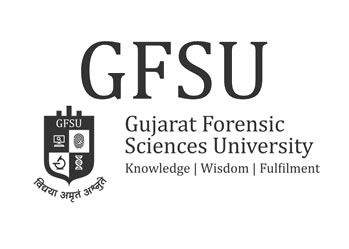
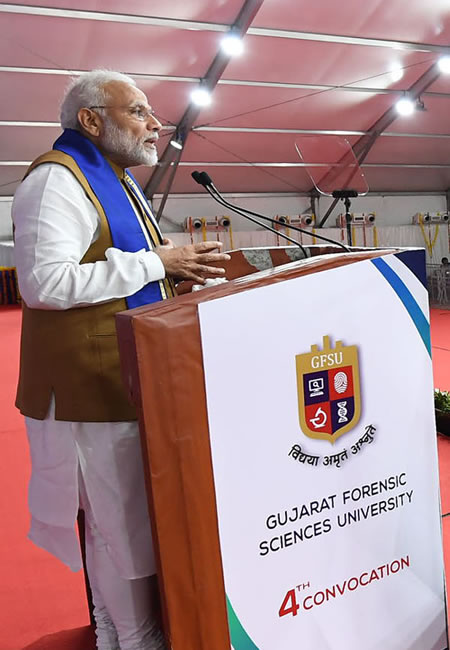
Photo: The Prime Minister of India, Narendra Modi, addressing at the 4th Convocation of the Gujarat Forensic Sciences University, in Gandhinagar, Gujarat on August 23, 2018.
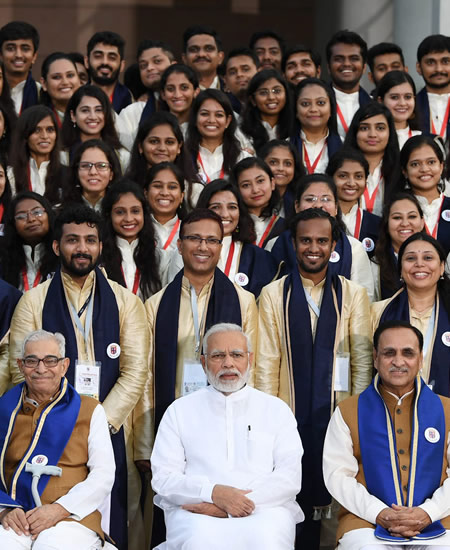
Photo: The Prime Minister of India, Narendra Modi, at the 4th Convocation of the Gujarat Forensic Sciences University, in Gandhinagar, Gujarat on August 23, 2018. The Governor of Gujarat, O.P. Kohli, and the Chief Minister of Gujarat, Vijay Rupani, are also seen.
The Prime Minister of India, Narendra Modi, today attended the convocation ceremony of the Gujarat Forensic Sciences University in Gandhinagar, Gujarat.
He described the University and its students as pioneers. He appreciated the students for their persistence in selecting a stream that is conventionally believed to be unconventional but is highly essential for today’s age. He said that these traits of self-belief and determination would help the students in times to come.
The Prime Minister said that a robust forensic science setup helps in ensuring public safety and curbing crime much the same way as an efficient police force and a competent judiciary.
Forensic science is crucial since it makes a potential criminal fear that he is very likely to be caught if he commits a crime, the Prime Minister said.
“Not just India, but from across the globe, Law Enforcement Agencies are coming forward to ask for help from your university. Your university is getting a reputation at the international level by helping many countries by providing training and consultancy to their people.”
“I have been told that in the last five years, Gujarat Forensic Science University has trained more than six thousand officers. The University has trained more than 700 police officers from more than 20 countries. After returning to their respective countries, the officers are using their knowledge and skills to keep their country and society safe today. It is a matter of great pride for all of you and Gujarat that this University is playing such a decisive role in Global Security on the strength of its training and education.”
“Friends, criminals and ways of committing crime are constantly changing. To deal with the rapidly changing crime scenario, you have to develop newer techniques to make it clear that we will not spare the criminals. The Government is establishing a State of the Art lab at Central Forensic Science Laboratory, Chandigarh. I am confident that in the coming times, we will be able to speedily and accurately investigate crimes,” Mr. Modi told the audience.
|GlobalGiants.Com|
Edited & Posted by the Editor | 3:23 PM | View the original post
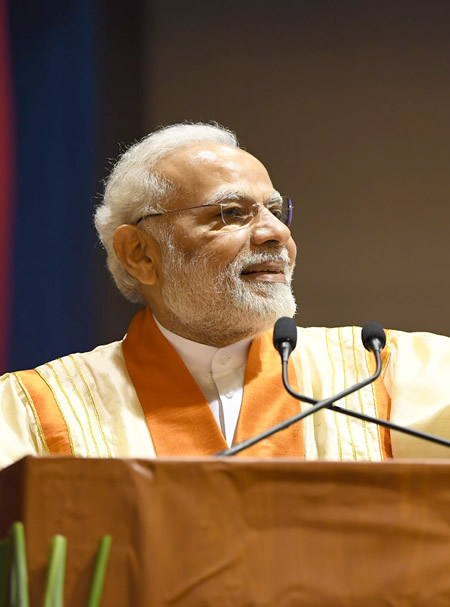
Photo: The Prime Minister of India, Narendra Modi, delivering the convocation address at the 56th Annual Convocation of the Indian Institute of Technology, Bombay, in Mumbai on August 11, 2018.
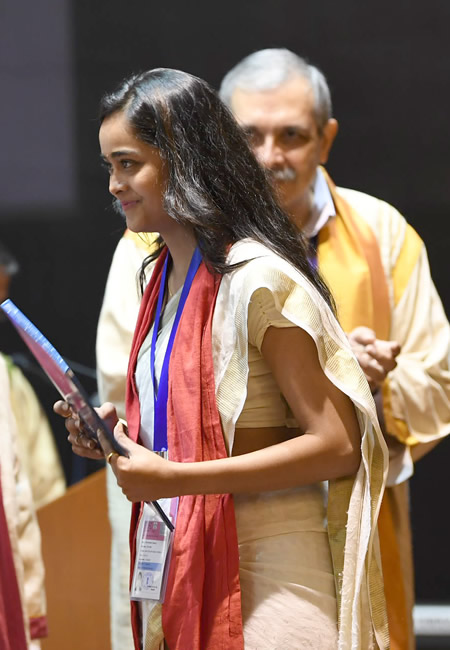
Photo: An award winner at the 56th Annual Convocation of the Indian Institute of Technology, Bombay, in Mumbai on August 11, 2018.
Mumbai, India, August 11, 2018 — The Prime Minister, Narendra Modi, today delivered the convocation address at the 56th Annual Convocation of the Indian Institute of Technology Bombay.
“IIT Bombay is one of those institutions of independent India which were conceived to give a new direction to nation building through technology. For the past 60 years, you have continued in this mission. During this time, you have established yourself among the top institutions of the world. Your institution is celebrating its Diamond Jubilee. However, more important than that, all the diamonds which are present here in front of me, who are graduating today, who have been graduating from here, are illuminating the name of India all over the world,” Mr. Modi told the gathering.
“The result of the continuous efforts of the last six decades is that IIT Bombay has made its place among the country’s selected Institutions of Eminence. So now you are going to get the financial help of Rs. 1000 crores which would be useful in the development of infrastructure here in the future. I congratulate you and the whole team for this,” Mr. Modi said, referring to the “Institution of Eminence” status the Government of India has accorded to the Indian Institute of Technology Bombay. See this post for more information —
Government of India grants "Institution of Eminence" status to Six institutes
“The nation is proud of the IITs, and what IIT graduates have achieved. The success of the IITs led to the creation of several engineering colleges around the country. The IITs inspired them, and this led to India becoming one of the world’s largest pools of technical workforce. Over the years, the IITs have built Brand India globally. IIT graduates went to America and excelled there: first as students in Universities and then as technology experts, entrepreneurs, executives and in academics. It was a large number of IIT students who built the IT sector in India, brick by brick..or I should say, click by click,” Mr. Modi declared.
“The degree you have received today is a symbol of your dedication to your goal. Remember that this is just a pause, the real challenge is waiting outside. What you have achieved till today and what you are going to do now is linked with the expectations of yourself, your family, and the hundred and fifty million countrymen. What you are going to do will be the basis of the New India. Once again many Good Wishes and Congratulations. I consider myself honored that I have had the opportunity to spend some time among you all,” Mr. Modi concluded.
The Union Minister for Human Resource Development, Prakash Javadekar; the Governor of Maharashtra, C. Vidyasagar Rao; the Chief Minister of Maharashtra, Devendra Fadnavis; and many other dignitaries attended the gathering.
|GlobalGiants.Com|
आज इस अवसर पर सबसे पहले मैं डिगà¥à¤°à¥€ पाने वाले देश-विदेश के विदà¥à¤¯à¤¾à¤°à¥à¤¥à¤¿à¤¯à¥‹à¤‚, और उनके परिवारों को बधाई देता हूं, उनका अà¤à¤¿à¤¨à¤‚दन करता हूं: PM
— PMO India (@PMOIndia) August 11, 2018
बीते 6 दशकों की निरंतर कोशिशों का ही परिणाम है कि IIT Bombay ने देश के चà¥à¤¨à¤¿à¤‚दा Institutions of Eminence में अपनी जगह बनाई है।
— PMO India (@PMOIndia) August 11, 2018
आपको अब à¤à¤• हज़ार करोड़ रà¥à¤ªà¤ की आरà¥à¤¥à¤¿à¤• मदद मिलने वाली है जो आने वाले समय में यहां इंफà¥à¤°à¤¾à¤¸à¥à¤Ÿà¥à¤°à¤•à¥à¤šà¤° के विकास में काम आने वाला है: PM
Edited & Posted by the Editor | 10:35 AM | View the original post
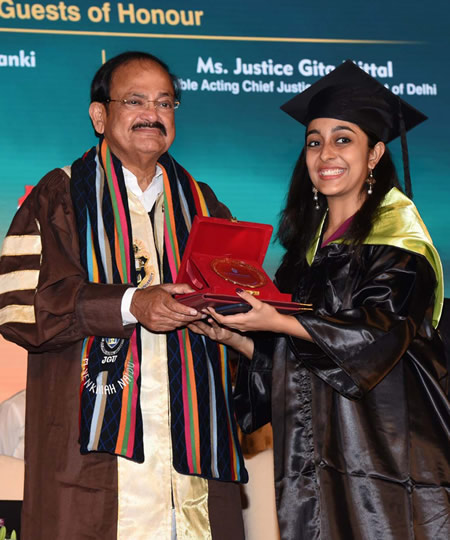
Photo: The Vice President of India, M. Venkaiah Naidu, presenting medals to the students at the 7th Convocation of O.P. Jindal Global University, in New Delhi on August 07, 2018.
New Delhi, India, August 7, 2018 — “Strong, non-profit, philanthropic private universities, aimed at providing quality education and promoting academic freedom need to emerge at the earliest,” the Vice President of India, M. Venkaiah Naidu, said while addressing the 7th Convocation of O.P. Jindal Global University, here today.
“This process needs to go hand-in-hand with the development of existing public universities that suffer from inadequate funding for faculty and infrastructure,” Mr. Naidu added.
“Sadly, the World University Rankings over the years have not been featuring even a single Indian university in the list of top 200 ranked institutions of the world. I am deeply conscious of the fact that other developing countries like China have made vast strides in quality higher education, while India has lagged behind. We need to change this dismal scenario and infuse new values and future-oriented thinking in our universities, particularly by learning from best practices of other universities around the world which have leapfrogged in a short duration,” Mr. Naidu said.
“I believe that our universities should have open doors to collaborations with the best institutions in the world to ensure student mobility, joint faculty research, and joint projects. That way, some of the deficits in our system can be overcome through knowledge transfer. We are in an era where innovation need not mean reinventing the wheel on all aspects of university management and functioning. We can easily pick up good ideas and adapt them to Indian conditions, provided we have an open mind.”
“Our institutions are still saddled with unnecessary bureaucratic baggage, narrow academic politics, and absence of visionary administrative leadership. Financial weakness and low quality of higher education are two sides of the same coin. I wish to emphasize that significant private sector contributions are vital for new and innovative universities to come up.”
“To create world-class universities, we must draw from experiences around the world, and, a mere glance at top-ranked public and private universities around the world makes it apparent that the non-profit system is one effective way to ensure excellence in teaching, research, and capacity-building,” Mr. Naidu observed.
“I have noted that O.P. Jindal Global University has a large number of full-time foreign faculty members recruited from top universities across the world. Let me end by congratulating once again the graduating students. Remember that India and the world are waiting for you to make a valuable contribution to public well-being. No matter which profession you take up after graduating, always keep high moral values as your guiding principle,” Mr. Naidu concluded.
|GlobalGiants.Com|
Edited & Posted by the Editor | 8:21 AM | View the original post
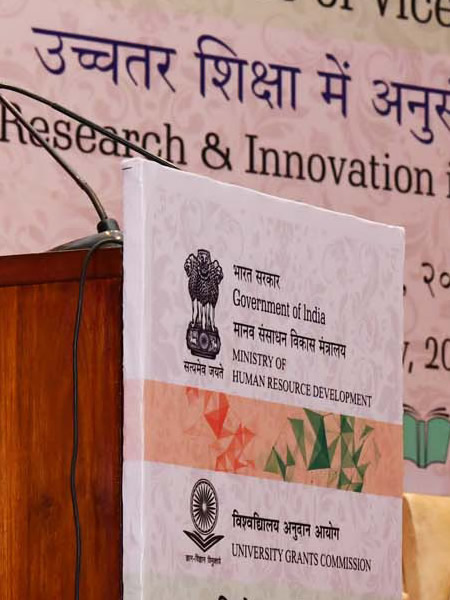
New Delhi, August 6, 2018 — The University Grants Commission of India (UGC) has asked all the Universities to refund the interest against grants or aids released to them.
“All interests earned against grants-in-aid released to university should be mandatorily remitted to the UGC account after finalization of accounts. Any interests earned out of grants-in-aid should not be treated as additional funds over and above the allocation,” the commission said in a communication to Registrars of all Universities.
The UGC has asked the universities to refund the amount at the earliest and send the compliance report to it.
|GlobalGiants.Com|
Edited & Posted by the Editor | 8:40 AM | View the original post
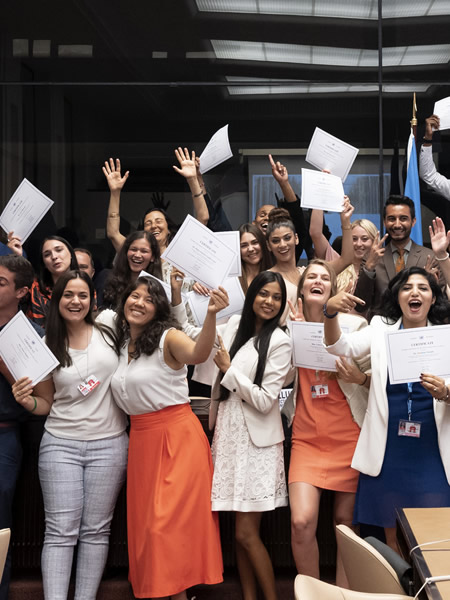
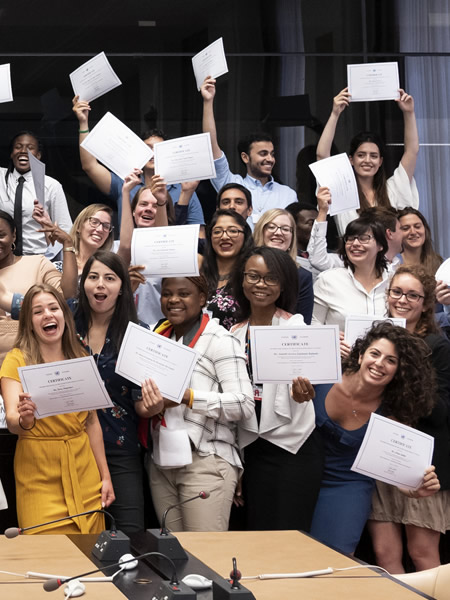
Photos: Participants of the United Nations Graduate Study Programme in front of the Palais des Nations in Geneva, Switzerland. 13 July 2018. UN Photos / Jean-Marc Ferré.
To deepen the understanding of the United Nations system through first-hand observation and study, the United Nations Information Service conducts Graduate Study Programme at the United Nations Office at Geneva each year.
This seminar provides an opportunity for outstanding graduate and postgraduate students from all over the world to deepen their understanding of the principles, purposes, and activities of the United Nations and its related agencies.
The 56th Graduate Study Programme was held at the Palais des Nations from 2 to 13 July 2018. It comprised lectures given by senior members of the United Nations and the Geneva-based specialized agencies.
|GlobalGiants.Com|
Edited & Posted by the Editor | 4:45 AM | View the original post
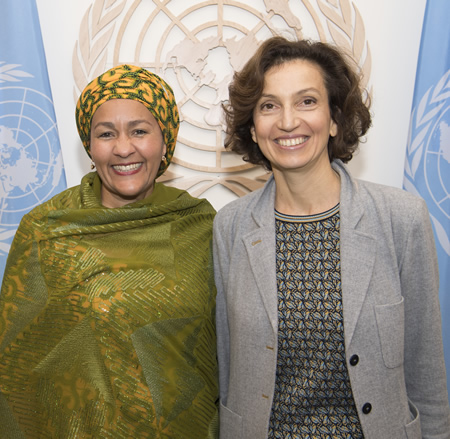
Photo: United Nations Deputy Secretary-General, Amina Mohammed (left), meets with Audrey Azoulay, Director-General of the United Nations Educational, Scientific and Cultural Organization (UNESCO). United Nations, New York. UN Photo/Eskinder Debebe.
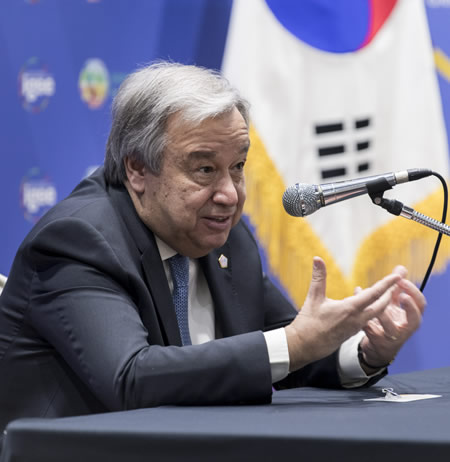
Photo: UN Secretary-General, António Guterres, speaks at Yonsei University in Seoul, South Korea while attending the Global Engagement and Empowerment Forum on Sustainable Development (GEEF-SD). Seoul, South Korea. UN Photo/Mark Garten.
New York: UNESCO, as a partner of the Higher Education Sustainability Initiative (HESI), joined the “Higher Education Sustainability Initiative Global Event,” held at United Nations Headquarters, at the margins of the High-level Political Forum 2018.
The global event for higher education institutions brought together diplomats, UN officials, education experts, university administrators and students to share their experiences and strategies for advancing the sustainable development agenda. University administrators from all over the world participated in the discussion, including from the University of São Paulo, Universidade de Cabo Verde, Universidad de Monterrey, Rutgers University, University of Pennsylvania and Yale University.
Liu Zhenmin, Under-Secretary-General for Economic and Social Affairs, underscored that equal access to education for all men and women is a fundamental building block for sustainable peace and sustainable development.
Lily Gray, Senior Program Specialist and Liaison Officer from UNESCO’s New York office, moderated the session on highlighting innovative collaborations between Higher Education Institutions and the United Nations. In her opening remarks, Ms. Gray stressed the importance of Education for Sustainable Development, which empowers learners with knowledge, skills, and values they need to address the social, environmental and economic challenges of the 21st century. UNESCO representative emphasized that universities and higher education institutions have a pivotal role to play in Global Action Programme on Education for Sustainable Development, by contributing to analysis and diagnosis of sustainability challenges to inform policy, conducting research and providing advice on strengthening national education systems and capacity building for sustainable development across different sectors.
The interactive discussion explored how the world is integrating 2030 Agenda for Sustainable Development into sustainability strategies, research, teaching, pedagogy, and campus practices, and how it is positioning higher education institutions as crucial drivers for achieving the Sustainable Development Goals.
The Higher Education Sustainability Initiative (HESI), is a partnership between United Nations Department of Economic and Social Affairs, UNESCO, United Nations Environment, UN Global Compact’s Principles for Responsible Management Education (PRME) initiative, United Nations University (UNU), UN-HABITAT, UNCTAD, and UNITAR. With commitments from over 300 universities from around the world, it provides higher education institutions with a unique interface between higher education, science, and policy-making.
UNESCO is the only UN agency with a mandate in higher education. As such, it contributes to developing evidence-based higher education policies. In line with Target 4.3 of Sustainable Development Goal 4 that says “by 2030, ensure equal access for all women and men to affordable and quality technical, vocational and tertiary education, including university,” UNESCO provides technical support to the Member States to review higher education strategies and policies in order to improve equitable access to quality higher education and enhance mobility and accountability. Through its UNITWIN/UNESCO Chairs Programme, UNESCO partners with higher education institutions to advance teaching, learning and research that supports the development of sustainable knowledge societies.
|GlobalGiants.Com|
Edited & Posted by the Editor | 1:25 PM | View the original post
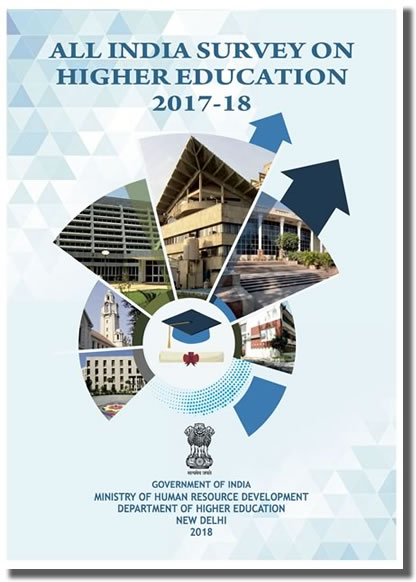
New Delhi, India, July 28, 2018 — Vice-Chancellors from across the country today reaffirmed their commitment to improving the quality of teaching-learning process and achieving the UGC Quality Mandate in Universities and the affiliated institutions by 2020 and NAAC accreditation for all institutions by 2022.
The one-of-its-kind 3-day Conference on “Research and Innovation” for the Vice-Chancellors & Directors of Higher Educational Institutions was organized from July 26-28 and inaugurated by Prakash Javadekar, the Minister for Human Resource Development with Dr. Satya Pal Singh, MoS for Human Resource Development as Guest of Honour. The Secretary (Higher Education), MHRD; the Chairman, UGC; Chairman, AICTE; officials of MHRD and the UGC; Vice-Chancellors of Central Universities, State Public Universities, Deemed to be Universities, State Private Universities; Directors of Central Institutions such as IITs, IIMs, IISc, NITs, IIITs, IISERs and other central institutions participated in the conference.
More than 600 Vice-Chancellors and Directors attended the conference, which coincided with the auspicious occasion of “Guru Purnima.”
The Conference had six sessions on themes ‘promoting research and innovations’, ‘quality mandate,’ ‘teachers training,’ and ‘digital initiatives.’ The conference had open forums where all delegates freely interacted with the HRD Minister on the issues of higher education and deliberated over the actions required to achieve the quality education. 65 universities/institutions made presentations on achievements and best practices related to the themes of the conference.
The Conference unanimously adopted the following 10-Point Resolution:
WE RESOLVE TO:
|GlobalGiants.Com|
Edited & Posted by the Editor | 10:08 AM | View the original post
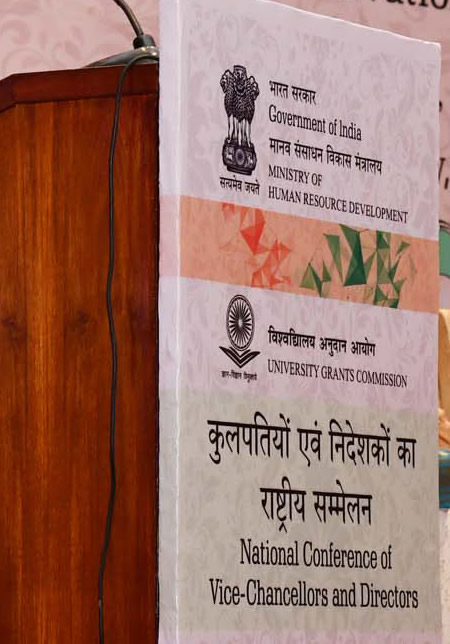
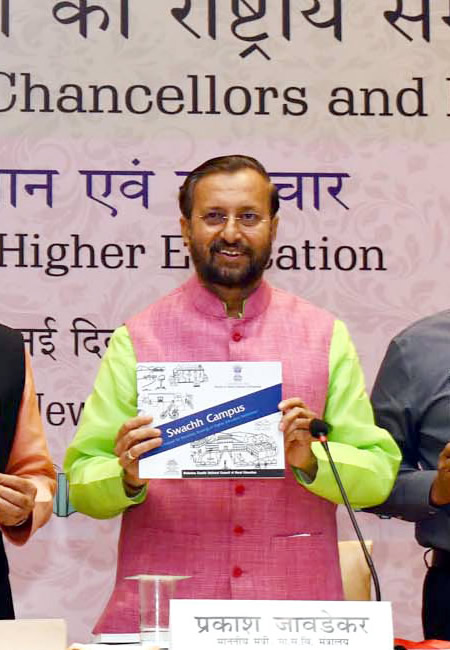
Photo: Keep Your University/College Campus Clean! India’s Minister for Human Resource Development, Prakash Javadekar, releasing the “Swachh [Clean] Campus” Manual along with the Higher Educational Profile 2017-18 and the All India Survey of Higher Education (AISHE) Report 2017-18.
New Delhi, India, July 27, 2018 — On the auspicious occasion of Guru Purnima, India’s Ministry of Human Resource Development organized a National Conference of Vice Chancellors & Directors of Higher Education Institutions of India in New Delhi today. Union Minister of Human Resource Development, Prakash Javadekar, chaired the conference and Minister of State for HRD Higher Education Dr. Satya Pal Singh also graced the occasion.
The three- day Conference started on 26th July and will culminate on 28th July 2018. All Vice Chancellors of Central Universities, State Public Universities, Deemed to be Universities, State Private Universities, Directors of Central Institutes, such as IITs, IISc., IIMs, IISERs, IIITs, NITs and other central institutions are participating in the Conference.
Addressing the participants, Javadekar said that all research projects of the ministry would be made available to teachers and students of all Universities. Turnitin software will be available at no cost basis to all Universities in the country. It would check plagiarism.
The Minister released the All India Survey on Higher Education (AISHE) report 2017-18, Higher Education Profile 2017-18, and “Swachh [Clean] Campus,” a manual for Swachhta [Cleanliness] of Higher Education Institution campuses.
|GlobalGiants.Com|
India is holding a three day National Conference of Vice Chancellors of Universities, and Directors of Higher Education Institutions.
— GlobalGiants.Com (@GlobalGiants) July 28, 2018
à¤à¤¾à¤°à¤¤ विशà¥à¤µà¤µà¤¿à¤¦à¥à¤¯à¤¾à¤²à¤¯à¥‹à¤‚ के कà¥à¤²à¤ªà¤¤à¤¿, और उचà¥à¤š शिकà¥à¤·à¤¾ संसà¥à¤¥à¤¾à¤¨à¥‹à¤‚ के निदेशकों का तीन दिवसीय राषà¥à¤Ÿà¥à¤°à¥€à¤¯ समà¥à¤®à¥‡à¤²à¤¨ आयोजित कर रहा है। https://t.co/Z7afuZh2Cf
Edited & Posted by the Editor | 10:11 AM | View the original post

Photo: The President of India, Ram Nath Kovind, presenting the degree certificate to a student at the 64th Annual Convocation of IIT Kharagpur, in West Bengal on July 20, 2018.
The President of India, Ram Nath Kovind, graced and addressed the 64th annual convocation of Indian Institute of Technology (IIT) Kharagpur today (July 20, 2018) in Kharagpur, West Bengal.
The President said that IIT Kharagpur has its origins in a committee that was set up by the government shortly after Independence to take stock of technical education. British Nobel laureate Dr. A.V. Hill headed the committee. Dr. Hill recommended the setting up of an institution modeled on the pattern of the Massachusetts Institute of Technology (MIT) in the United States. The use of global experts to conceive this Institute was appropriate. The result is the Institute we are in today. Over the years, IIT Kharagpur, and in fact, the IIT network and community has become a critical window to the world. Exchange of ideas, of expertise, of knowledge - across fields, from engineering to economics, from medicine to management - has contributed to our policy choices and our people’s development.
The IIT Kharagpur community is a prized resource for India and the world. As graduating students will soon realize, the IIT Kharagpur brand name and the reputation built by the achievements of generations of illustrious alumni will accompany you wherever you go. You are now part of a transcontinental talent pool that has added value to technology and wealth creation and, above all, to human lives. Your Institute took a significant step towards strengthening India’s global academic linkages when it started the International Summer Winter Term Programme, the President said.
|GlobalGiants.Com|
Edited & Posted by the Editor | 4:15 PM | View the original post
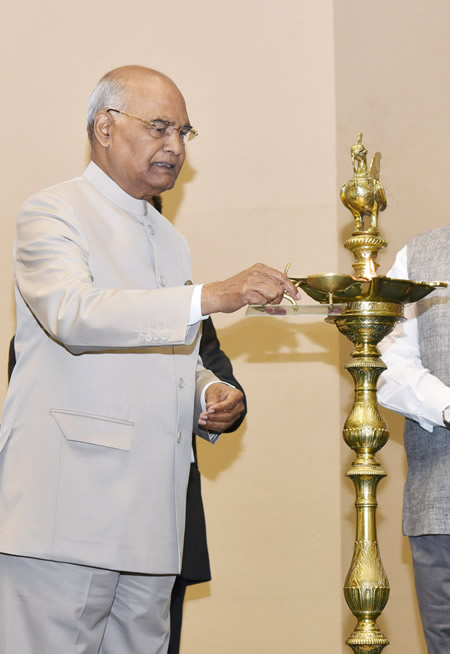
Photo: The President of India, Ram Nath Kovind, lighting the lamp at the Platinum Jubilee Celebrations of the Institute of the Cost Accountants of India (ICMAI), in New Delhi on July 14, 2018.
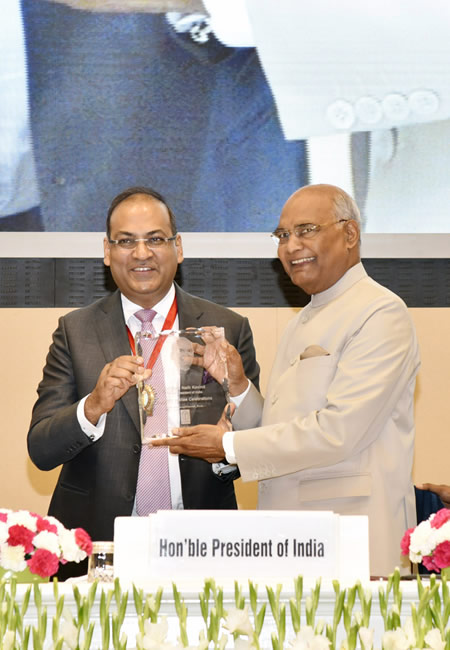
Photo: The President of India, Ram Nath Kovind, at the Platinum Jubilee Celebrations of the Institute of the Cost Accountants of India (ICMAI), in New Delhi on July 14, 2018.
New Delhi, July 14, 2018 — The President of India, Ram Nath Kovind, today inaugurated the platinum jubilee celebrations of the Institute of Cost Accountants of India.
The President said that cost accountants play a substantial part in enhancing the efficiency of processes. Cost accountants are the best managers of the three Ms in a business organization. These are - men and women who work there; the materials used as inputs; and the machines deployed for processing, fabrication, and creation.
As global manufacturing evolves and as manufacturing gets a boost over the coming decade, cost accountants will have a bigger and more prominent role. It will be Cost accountants’ mandate to ensure that products and services are delivered at a competitive price but without compromising on quality.
The President said that it is for cost accountants to ensure that the administrations remove wasteful activities and costs in production. It is for cost accountants to help in innovation and improvement of processes and systems to reduce avoidable costs and make each invested rupee go that much further. It is for cost accountants to help fight the aberrations of gold plating that may sometimes appear on our business landscape. All this will strengthen the national effort in establishing India as a low-cost and competitive manufacturing hub for world-class products.
“I would encourage you to help promote financial literacy among women, particularly young women. I have mentioned this on previous occasions as well and believe this can go very far in changing attitudes and empowering women in our society. As financial and business professionals, you should and must be part of this social change,” the President told the Cost Accountants.
|GlobalGiants.Com|
#PresidentKovind inaugurates platinum jubilee celebrations of the Institute of Cost Accountants of India; urges cost accountants to strengthen the national effort to establishing India as a low-cost and competitive manufacturing hub for world-class products pic.twitter.com/MWhA6rqQo9
— President of India (@rashtrapatibhvn) July 14, 2018
Edited & Posted by the Editor | 6:09 AM | View the original post
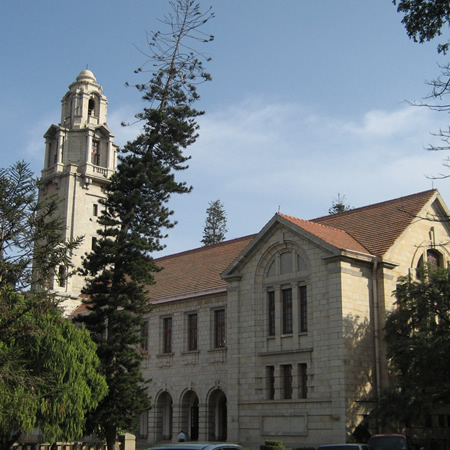
Photo: Indian Institute of Science Bangalore. The original building built in 1937. Image Credit: Bill.
India’s Human Resource Development Minister, Prakash Javadekar, today, announced the names of six institutes, three in public sector and three in private industry, which have been accorded the status of Institution of Eminence by the government of India.
The government had constituted an Empowered Expert Committee (EEC) to select the Institutions of Eminence. All the Applicant Institutions made presentations before the EEC from 2nd April 2018 to 8th May 2018. The Committee in its report recommended selection of only six institutions (three from the public sector and three from the private sector) as Institutions of Eminence.
From the public sector, the government has granted this status to the following three institutes:
From the private sector, the government has granted this status to the following three institutes:
The Institutions of Eminence will have the freedom to fix and charge the fee from international students without restriction and would have the freedom to determine the domestic students’ costs, subject to the condition that no student who gains admission should be turned away for lack of finance.
The Institutions of Eminence shall have the flexibility of course structure regarding credit hours and the number of years to take a degree under the prevailing minimum standards.
The Institutions of Eminence will have the freedom to enter into academic collaboration with top 500 Global ranking institutions without the approval of the Government.
Each public Institution selected as ‘Institution of Eminence’ will get financial assistance up to Rs. 1000 Crore over the period of five years under this scheme.
The target for the Institutions of Eminence would be to break into the top 500 bracket in the internationally reputed ranking frameworks and then come up in the top 100 over time.
|GlobalGiants.Com|
The #InstituteofEminence are important for the country. We have 800 univ, but not a single university in top 100 or even 200 in the world ranking. Today's decision will help achieve this. #InstituteofEminence #TransformingEducation #48MonthsOfTransformingIndia @PIB_India
— Prakash Javadekar (@PrakashJavdekar) July 9, 2018
Congratulations to @iitbombay & IITDelhi. These are two premier institutes which will also receive government funding because public sector institutes which are granted status of Institutes of Eminence will get govt grant of Rs 1000 crore in next five years. #InstituteofEminence pic.twitter.com/n7NRnjR0Qh
— Prakash Javadekar (@PrakashJavdekar) July 9, 2018
Congratulations to @ManipalUni, @bitspilaniindia & Jio Inst for getting status of #InstituteofEminence. #TransformingEducation #48MonthsOfTransformingIndia@PIB_India @MIB_India pic.twitter.com/XpRsm8nxIQ
— Prakash Javadekar (@PrakashJavdekar) July 9, 2018
Edited & Posted by the Editor | 6:32 AM | View the original post
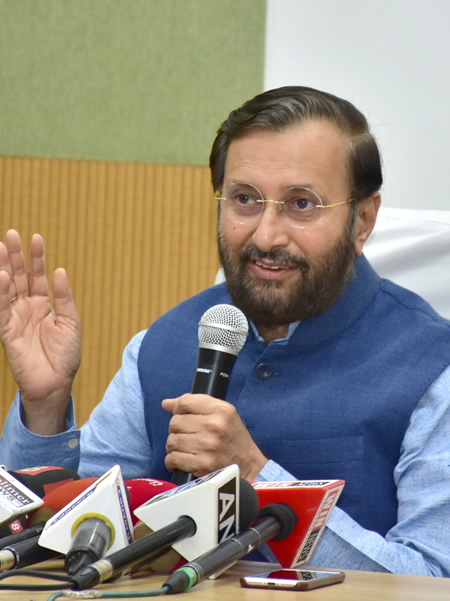
Photo: India’s Union Minister for Human Resource Development, Prakash Javadekar, addressing a press conference.
New Delhi, June 27, 2018 — In a landmark decision, a Higher Education Commission of India (Repeal of University Grants Commission Act) Bill 2018 which seeks to repeal UGC Act and provides for setting up of Higher Education Commission of India has been prepared by the Ministry of HRD (Human Resource Development) and placed in public domain for comments and suggestions. The focus of Higher Education Commission of India will be on improving academic standards and the quality of Higher Education.
The Union Minister for Human Resource Development, Prakash Javadekar, has appealed to all educationists, stakeholders and the general public to furnish comments and suggestions by 7th July 2018 till 5 p.m. on the draft Bill.
The Government announced that the draft Act is following its commitment to reform the regulatory systems, provide for more autonomy, and facilitate the holistic growth of the education system that presents more significant opportunities to the Indian students at more affordable cost.
The following principles guide the transformation of the regulatory set up:
• Less Government and more Governance:
No more interference in the management issues of the educational institutions.
• Separation of grant functions:
The grant functions would be carried out by the HRD Ministry, and the HECI would focus only on academic matters.
• End of Inspection Raj:
Regulation will be conducted through transparent public disclosures, merit-Âbased decision making on matters regarding standards and quality in higher education.
• Focus on academic quality:
HECI will have the mandate of improving educational standards with the specific focus on learning outcomes, evaluation of academic performance by institutions, mentoring of institutions, training of teachers, and promoting the use of educational technology. It will develop norms for setting standards for opening and closure of institutions, provide for greater flexibility and autonomy to institutions, and lay rules for appointments to critical leadership positions at the institutional level irrespective of the law under which a University was started.
• Powers to enforce:
The Regulator will have powers to enforce compliance with the academic quality standards and will have the authority to order the closure of subÂstandard and bogus institutions.
|GlobalGiants.Com|
Edited & Posted by the Editor | 11:44 AM | View the original post
 |
 |
